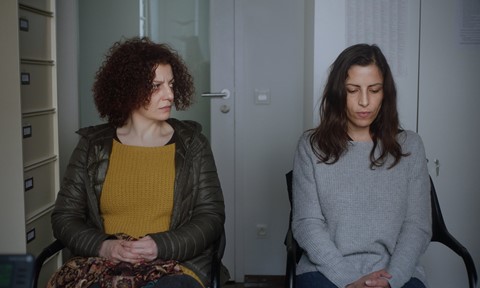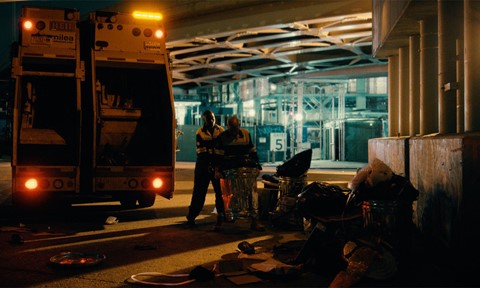FROM CLASSICAL MUSIC TO SINGER-SONGWRITER


It’s quiet in the foyer of the opera house. All that’s heard are the muffled sounds of the aria from the auditorium. This changes abruptly when the grand doors open for intermission and the audience, dressed to the nines, pours out into the foyer. As some of them drink a glass of wine or have a small snack, others sense an opportunity. They pull out their smartphones, carefully select a lavish background, and take a selfie, as if they’d spent the whole performance waiting for this moment.
The documentary film OPERA GLASSES by Mila Zhluktenko tells of the vibrant hustle and bustle at the National Opera in Kyiv. Yet the performance itself is never seen, and the music can only be heard through the doors to the auditorium. The focus is on what’s happening in the foyer. Before the performance starts, the chic operagoers quickly adjust their make-up in front of a mirror, comb their hair one last time, or straighten their clothes. The cloakroom attendants take the countless fur coats and lend opera glasses in order to earn a little pocket money. During the performance, they complain about guests who arrive late, and offer a theory that Russian leaders alternate between hairy and bald. The music of the opera becomes a mere backdrop to these curious moments offstage.
The comedy THE BEST ORCHESTRA IN THE WORLD by Henning Backhaus also takes us into the world of classical music. Ingbert the sock applies to be a double bassist with the Vienna State Orchestra. But being a sock, he encounters a number of obstacles. His instrument is far too big for him, and a closed door almost prevents him from walking onstage. The film is a biting satire. In order for the selection committee to reach a decision without bias, the audition is held behind a curtain. But when the curtain falls, Ingbert faces discrimination. Music, the language that supposedly everyone understands, ultimately isn’t “spoken” by everyone.
How much political power music can have is revealed by the documentary film ANGRY FOLKS from Myanmar. Two young musicians play the guitar for a crowd of striking factory workers. In the tradition of singer-songwriters, they perform their protest songs about injustice, poverty, and rebellion. The film also shows them helping workers to stage a play for International Workers’ Day. The two young activists want to encourage people, some of whom work under unbearable conditions, to stand up for their rights. Here, music becomes a wonderful tool of enlightenment and solidarity with the exploited.
The documentary film FEMININE HIP-HOP by Luis Peinado shows the extent to which music can be a source of identity for underprivileged people. The director takes a look at the female and in particular the queer hip-hop scene in Montréal. Three artists talk about their passion for music and about what making hip-hop means to them — because it unfortunately always goes hand in hand with having to resist transphobia and homophobia in a male-dominated community.
Music can also be used in the most casual way, as in the feature film RIO, in which two young women work at a small hotel in the middle of nowhere on the border between Finland and Russia. There aren’t any guests, and so in their boredom they daydream their way into a different, more exciting world. Director Zhenia Kazankina folds their monotonous routine into a wonderfully bizarre comedy and has the two of them dance, arms swinging, by the pool and down the wide hotel corridor. This is accompanied by Russian pop and hypnotic psychedelic rock from France. Dancing to the right music makes everything much more bearable.






